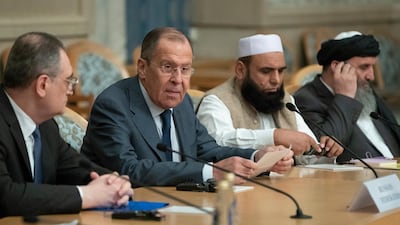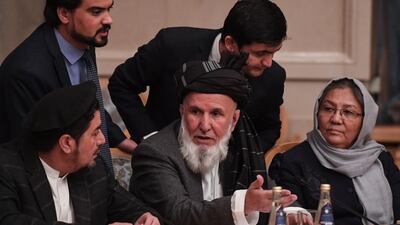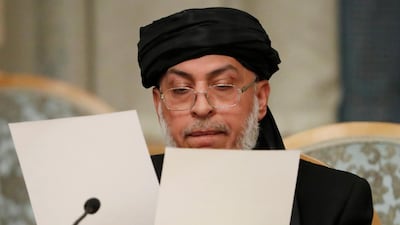Russia on Friday hosted representatives of the Afghan Taliban and the Afghan High Peace Council for a meeting on ending the country's 17-year insurgency.
Russia also invited a dozen countries to the talks in Moscow, which had been scheduled for September but were postponed at the urging of Afghan President Ashraf Ghani.
Mr Ghani sent four senior members of the High Peace Council to the talks on Friday who were seated around an oval table with the Taliban delegation.
Russia seeks to promote “inclusive, inter-Afghan dialogue” to try to resolve the civil war, Foreign Minister Sergei Lavrov said at the opening of the conference. The presence of both sides “will be an important contribution to providing favourable conditions for the start of direct talks between the government and the Taliban movement”, he said.
While the Moscow meeting is not likely to yield concrete results, Russia's intervention is taking place as US President Donald Trump's administration has stepped up diplomatic activity, twice sending officials to meet with the Taliban in recent months and appointing a veteran envoy, Zalmay Khalilzad, to advise on Afghan peace. Mr Khalilzad travelled to Afghanistan on Thursday for his second tour of countries in the region to further the US peace effort.
The Taliban have said they are ready to talk to the US to end the war, but not with the Afghan government, which they deem illegitimate.
The US sent an observer from its Moscow embassy to the meeting after it refused to attend the September talks, saying they would not help efforts to end the conflict.
It’s “very important to come here”, said Azizullah Din Mohammad, the head of the High Peace Council’s delegation. “When there is peace there will be no need for Americans in Afghanistan.”

______________
Read more:
US peace envoy to visit UAE, Afghanistan, Qatar and Pakistan
Russia flaunts Taliban talks snubbed by Afghan government
US requested release of Taliban founder to help peace talks
______________
Mr Ghani likely agreed to participate this time “because he recognised the significance of this meeting, even though it won’t result in anything substantive”, said Michael Kugelman, a senior associate for South Asia at the Woodrow Wilson Center in Washington. “Given how keen Kabul is to launch a peace process, amid a strengthening insurgency and intensifying violence, it recognises that any meeting about a peace process with Taliban participation is worth attending.”
Russia, which backs Taliban demands for a pullout of American forces, invited regional powers including Iran, India, Pakistan, Tajikistan, Uzbekistan and Turkmenistan to the talks, as well as the US. Mr Ghani opposed the September meeting in a call to Mr Lavrov, demanding that any peace moves be Afghan-led.
“Russia has managed to steal the agenda from the US,” said Ruslan Mamedov, programme director at the Russian International Affairs Council, a research organisation set up by the Kremlin. “It’s shown it is willing and capable of promoting national reconciliation in Afghanistan.”
No government, including Russia, can be a substitute for the Afghan authorities in direct negotiations with the Taliban, the US State Department said.
The Moscow meeting will examine ways to “initiate direct talks between the Afghan government and the Taliban”, a spokesman for the High Peace Council, Sayed Ehsan Tahiri, said by phone. Its representatives will not meet directly with the Taliban officials, he said.
Senior Taliban members from the group's political office in Doha attended to discuss the withdrawal of US and Nato forces and Afghan peace, a spokesman, Zabihullah Mujahed, said.
The insurgent group fighting with Afghan forces and their US backers contests or controls half of Afghanistan, more than at any time since the Taliban was toppled in 2001 in an American-led invasion to destroy terrorist training camps run by Osama Bin Laden.
Mr Ghani and the US are struggling to bring the group to the negotiating table. The US, which has accused Russia of arming the Taliban, has poured more troops into Afghanistan and conducted a series of air strikes as it seeks to regain the military edge.
Russia denies arming the Taliban although it says it is in dialogue with the movement that ruled the country from 1996 to 2001. It fought a decade-long war in Afghanistan during the Soviet era, losing thousands of troops before a humiliating military withdrawal in 1989.
______________
Read more: US soldier killed in 'insider attack' in Afghanistan was mayor of Utah city
______________
Despite the peace initiatives, the Taliban have continued attacks on government targets and forces. On Friday, at least 10 soldiers and seven policemen were killed in northern Takhar province.
Local police chief Abdul Rashid Bashir said the Taliban targeted an army outpost in Khwaja Ghar district early on Friday, triggering an hours-long gunbattle before they were repulsed.
Mr Bashir said at least 10 soldiers were killed and 12 were wounded, while the Taliban suffered "heavy casualties".
In western Farah province, the Taliban targeted police forces in the provincial capital, Farah city, late on Thursday. Seven policemen died and three were wounded, Associated Press reported, quoting a provincial council member, Abdul Samad Salehi.







